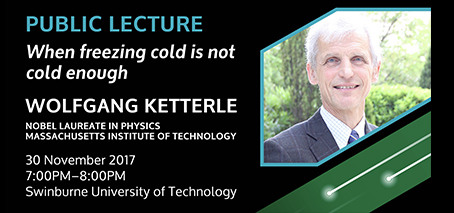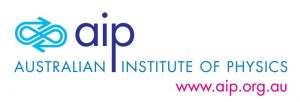 Public talk 30 November All are welcome to a public talk at Swinburne University of Technology (Hawthorn) at 7PM on Thursday 30 November. Prof Ketterle will discuss Bose-Einstein condensates, in which atoms are cooled to temperatures a billion times colder than outer space, and matter behaves as a wave, “marching in quantum lockstep”. These forms of ultra-low temperature matter, which are studied at Swinburne, open a new door to the quantum world. Bookings essential.
Public talk 30 November All are welcome to a public talk at Swinburne University of Technology (Hawthorn) at 7PM on Thursday 30 November. Prof Ketterle will discuss Bose-Einstein condensates, in which atoms are cooled to temperatures a billion times colder than outer space, and matter behaves as a wave, “marching in quantum lockstep”. These forms of ultra-low temperature matter, which are studied at Swinburne, open a new door to the quantum world. Bookings essential.
 Lunch with a Laureate 1 December Secondary school students and teachers are invited to join Prof Ketterle at Monash University (Clayton) for lunch on Friday 1 December. Prof Ketterle will present to students, who will then have the opportunity to talk to him in small groups. Bookings essential.
Lunch with a Laureate 1 December Secondary school students and teachers are invited to join Prof Ketterle at Monash University (Clayton) for lunch on Friday 1 December. Prof Ketterle will present to students, who will then have the opportunity to talk to him in small groups. Bookings essential.
FLEET is pleased to co-present Professor Wolfgang Ketterle with Monash University School of Physics and Astronomy, Swinburne University of Technology and The Australian Institute of Physics.
Why do physicists freeze matter to extremely low temperatures?
Why is it worthwhile to cool to temperatures a billion times lower than interstellar space?
Melbourne public and students will find out in November/December with a public talk and school event by Nobel Physics Laureate Wolfgang Ketterle, co-sponsored by the AIP.
Prof Ketterle, working at MIT, won the 2001 Nobel Prize in Physics with Eric Cornell and Carl Wieman of the University of Colorado for discovering the fascinating physics of Bose-Einstein condensates (BECs), in which ultra-cooled particles behave as waves and ‘march in lock-step’.
Einstein predicted such a new form of matter in 1925, but BECs were realised only in 1995 in the laboratories at MIT and Boulder, Colorado. More recently, ultra-cold atoms have become a tool to study phenomena of condensed-matter physics at huge spatial magnification, and at densities a billion times lower than ordinary materials.


